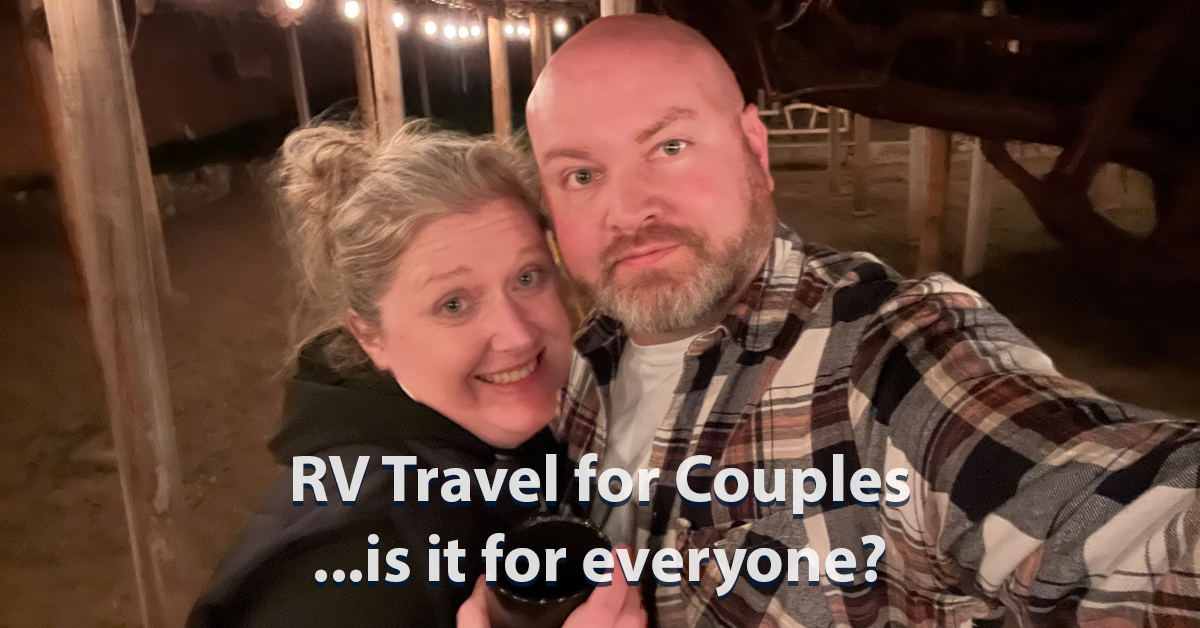What happens if you find yourselves not enjoying each other’s company as much as you thought you would while traveling in your RV?
It’s a lifestyle that appeals to many – hitting the road, bringing your home with you, and seeing the world around you. Some even go so far as to sell their homes and possessions and travel full-time, living as modern nomads. What’s not to love about it?
Welllllllll…the first question I would ask you is this – do you REALLY love the ones you’re traveling with? By that, we mean, are you going to be able to tolerate each other in close contact for extended periods of time without becoming increasingly tired of each other? Of course, if you’re traveling solo, this question is irrelevant, but if you have a significant other, you better make sure your relationship is both strong and secure, because you’re going to be spending a LOT of time together…and most of it will be in a small space.
We’re not saying you should have the perfect relationship with no disagreements (that’s not only unrealistic, but quite often unhealthy). We’re just saying that you should know HOW to have those disagreements without damaging your relationship. And we’re not talking about just parking the camper, either (though some of the most entertaining arguments have come from this necessary evil). This goes much deeper, especially in relation to how much time you’ll be spending together on a consistent basis.
How Much Time Is Too Much Time?
Think about it – many couples do not spend every waking hour together for days on end without some sort of break from each other (at least prior to 2020, anyway). They say absence makes the heart grow fonder, and going to work or even a trip to the store is often a way for couples to be able to do their own thing while also making their time together more valuable and appreciated.
When traveling in an RV, you are going to be spending a LOT of time together, often in close quarters. When driving (unless you have a motor home), you’re in a car for extended traveling periods, followed by working to hook up your rig to a campsite, then sitting together with little room between. We can speak from experience – if you have a “passionate disagreement” during your drive, the last thing you want to do is go sit in a cramped RV and stew.
Let’s also not forget the fact that traveling in and of itself can be stressful. Things come up. Breakdowns can mean entire trips are in jeopardy. Even a simple traffic jam or detour can throw off a schedule. If you plan ahead at least a few weeks out like we do, this can be an incredibly stressful situation. Patience can wear thin very quickly, leading to, shall we say, a less than pleasant traveling experience.
When tensions boil over and couples have nowhere to go to cool down, the results can be bad. If you’ve seen the Lucille Ball/Desi Arnaz film, The Long, Long Trailer, the main characters temporarily split and put their RV up for sale (before the 1950’s Hollywood happy ending, of course). In more tragic cases, we wind up with a Gabby Petito and Brian Laundrie scenario, where a relationship deteriorates catastrophically and tragically. Granted, the latter is the exception rather than the rule, but the fact remains – if a couple can’t get along, they don’t need to be in an RV or camper van together for days or weeks on end.
How To Handle Conflict With A Loved One When Traveling
So, how do you work with this? Well, in our experience, we try to do the following:
- Time Out
If you’re at the camp site, one may go take a walk. If you’re on the road, a quick stop for a snack can give you a breather. If you have no way to separate, then a set of earphones can help just to allow for a separate focus to cool down. - Reassess
What is it we were even arguing about? Was it a legitimate conflict, or was someone just unhappy with the SiriusXM station selection (yes, it happens!!)? It’s important to note that even smaller arguments can add up, so even if it was a goofy reason, it’s still healthy to at least address WHY it even became an argument in the first place. - Communicate!!!
This is both a no-brainer and the hardest part of conflict, and the reason is because you have two people who not only have differing ideas and opinions, but they both believe they are right and the other is wrong. The majority of the time, a simple compromise can resolve the issue, but this requires both parties to concede, at least to an extent. Admitting being wrong is not a weakness; it’s a strength that shows maturity. - Agree to Disagree
So what happens when you can’t reach a compromise? You simply disagree! It CAN be done in a healthy manner. Sure, there may be fundamental disagreements that either must be resolved or they may lead to damaging a relationship, but if you’re at that point, the traveling is an irrelevant factor, anyway.
Of course these tips don’t just apply to RV traveling. You can use these in everyday interaction with your partner. We try to stick by these steps no matter what our issue may be. If you have more suggestions, please let them in the comments below!
At the end of the day, if you find yourselves arguing more than you enjoy your time together while traveling, perhaps you should reconsider if such a lifestyle is the right choice for you. That’s not to say you can’t do it; you just may want to TRY it first to see if it works for you before committing beyond the point of no return.
Also, keep in mind that this is JUST talking about traveling couples. Next week, we’ll look at traveling with…KIDS!!!! 😲





0 Comments